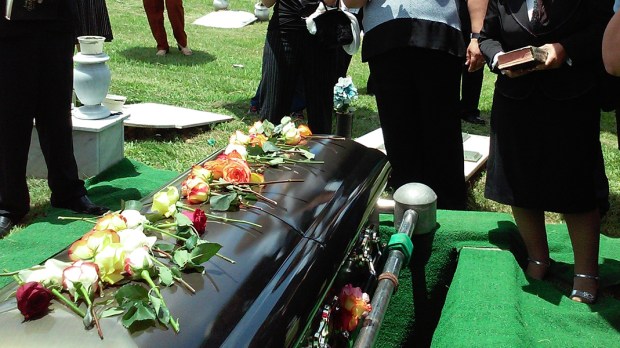Fewer people are going to wakes and funerals these days, according to surveys by the National Funeral Directors Association. The number of respondents who had attended a funeral in the past five years dropped from 10.3% in 2013 to 3.7% in 2019.
For Catholics, this trend is concerning. Burying the dead is a corporal work of mercy, something we must make time to do even when it’s hard.
This trend also sets us apart concerningly from most human beings throughout history. For millennia of human existence, mortality rates were much higher, and death was just about omnipresent. The luxury of being able to avoid reminders of death is unique to modernity.
But is the privilege of being able to ignore death a luxury, or a curse? Awareness of how brief life really is helps us to appreciate and enjoy it more. Cutting ourselves off from this unavoidable reality makes for a shallower experience, and we miss out on opportunities to grow in empathy and compassion.
This last point was eloquently highlighted in a gem of a column in the Chicago Tribune this month. The writer, Mary Wisniewski, described how she grew up going to funerals:
I come from an enormous family, which means I had to go to lots of wakes and funerals … I got used to funeral parlors—their hard, outdated and overly formal furniture, dim lighting, terrible artwork, weak coffee and stale cookies.
It’s becoming increasingly rare nowadays for parents to take this approach of bringing kids along to memorial services. Perhaps they reason that the child may not be ready for exposure to death. But death is natural and unavoidable, and children often are better at handling these things than we give them credit for:
My folks didn’t worry that we kids were getting exposed too early to death—death was part of life, and we had to go up to the casket, kneel and say a prayer.
Parents may also worry that kids won’t enjoy it. But Wisniewski points out that it doesn’t really matter if visitors want to be there or not:
My parents didn’t care whether my siblings and I were having a good time or not, because the wake was not for our amusement. It was not about us. It was for the consolation of people who had lost someone special.
Making time to go to a wake or a funeral, even when you don’t want to, and even when it’s inconvenient, not only honors the life of the person who has died but also is one of the most meaningful ways to support those left behind.
Wisniewski goes on to explain that her own mother very recently passed away. Dealing with death first-hand made her realize just how important it is for friends and family to come to memorial services. She uses the analogy of a quilt:
… when someone close to you dies, even if it’s expected, it’s like a bomb has gone off. And you and your family are wandering around in the rubble, shivering in the wind… At this time, the visits and calls from friends are like the pieces of a quilt. And the quilt pieces come together into a blanket and warm you, getting you through this time of shock and sorrow.
It really doesn’t matter if visitors have much to say or stay for long, she says. Simply the fact of being there is enough. When one is grieving, it helps so much to have others pause their busy lives to come and sit alongside for a little while.
“What you’ll give to a grieving family” by coming to the memorial service “is priceless,” Wisniewski writes.
It’s good advice, old-fashioned and a little unusual nowadays, but as true as ever: If you can, always go to the wake or funeral. You’ll never regret it.

Read more:
Memento mori: I’m planning my funeral, what about you?

Read more:
How a funeral gives me the spiritual boost I need

